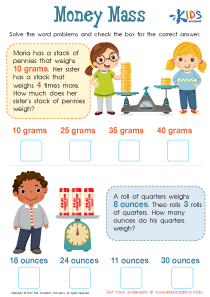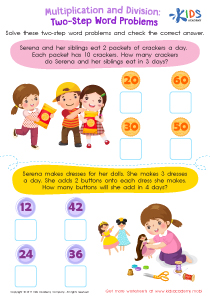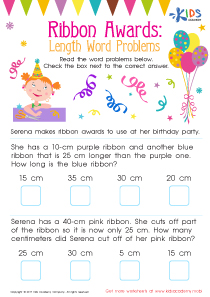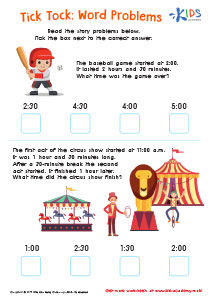Extra Challenge Two-step Word Problems Worksheets for Ages 3-4
3 filtered results
-
From - To
Introducing our Extra Challenge Two-step Word Problems Learning Worksheets, designed specifically for curious young minds aged 3-4 years. These engaging worksheets are perfect for helping preschoolers develop critical thinking and problem-solving skills through fun and interactive challenges. Each worksheet encourages young learners to navigate through two-step problems, enhancing early mathematical concepts and comprehension. Prepare your child for academic success with our carefully crafted exercises that make learning both enjoyable and rewarding. Dive into our learning worksheets and watch your child embrace the joy of learning and achievement. Ideal for both classroom and at-home learning environments.
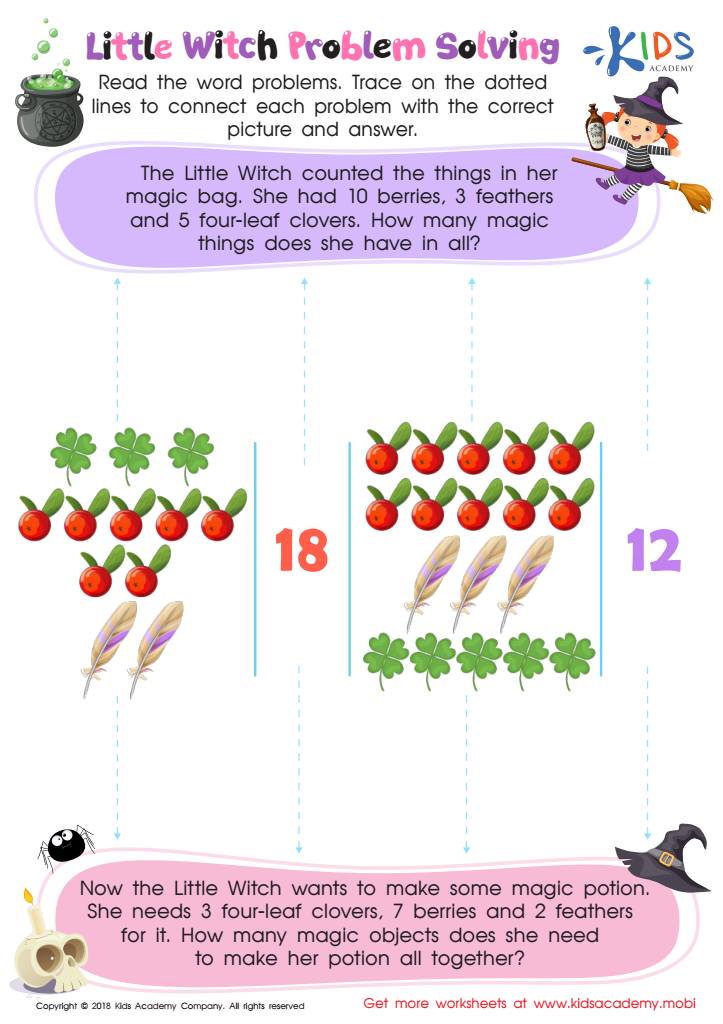

Little Witch Problem Solving Worksheet
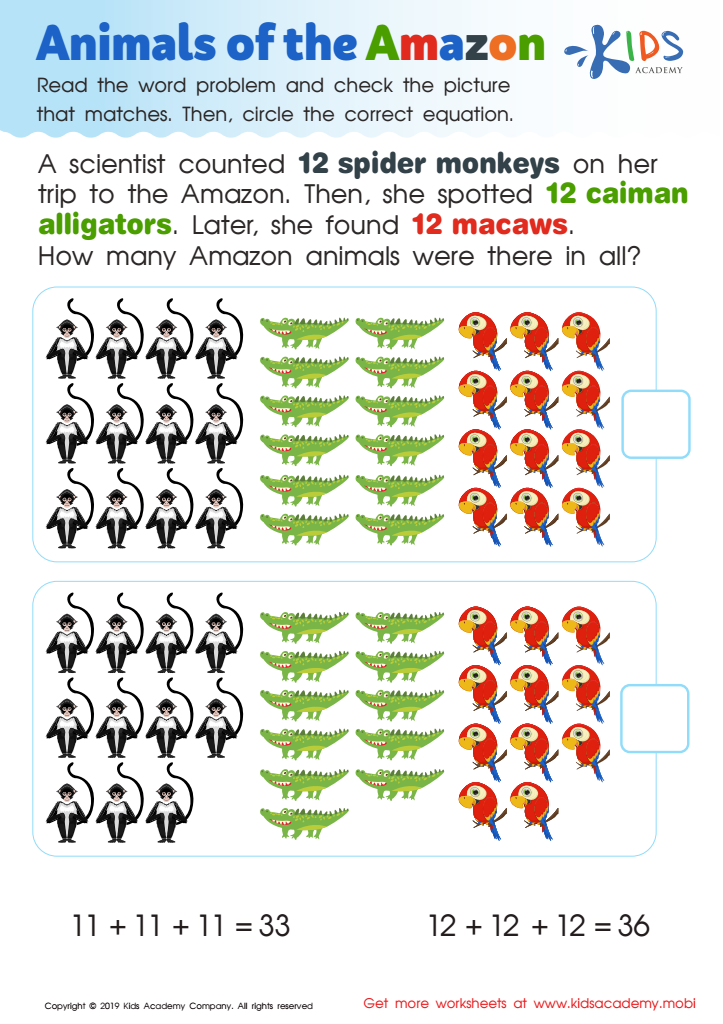

Animals of Amazon Worksheet
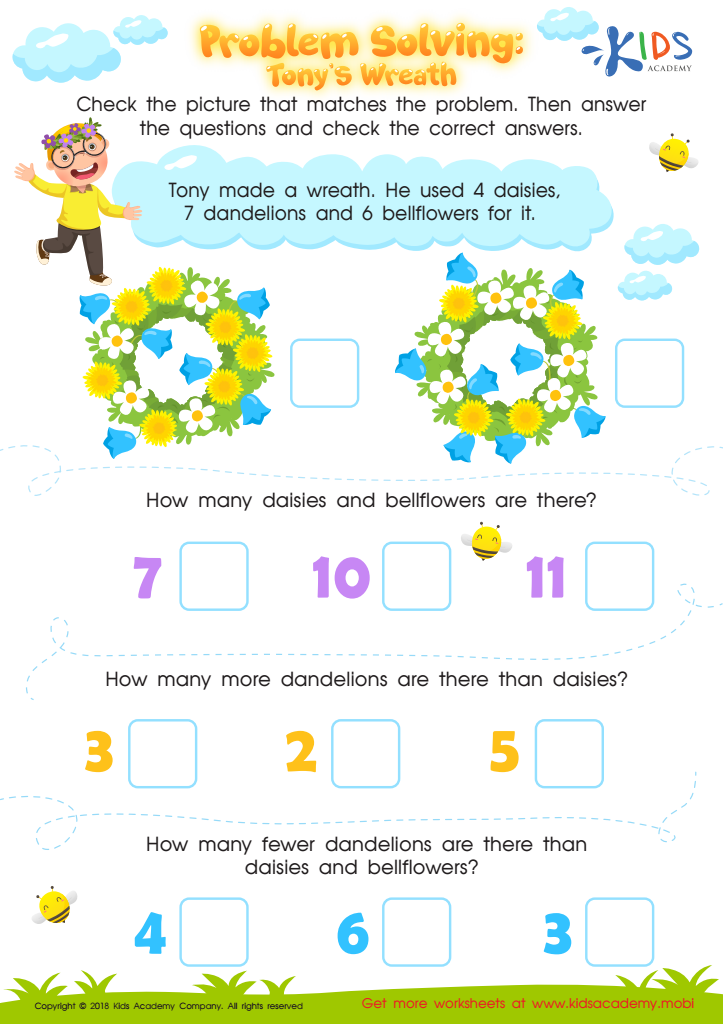

Problem Solving: Tony's Wreath Worksheet
The Value of Learning Printables: Extra Challenge Worksheets on Two-Step Word Problems for Ages 3-4
In the foundational years of education, equipping children with the skills necessary for critical thinking and problem-solving is crucial. Among the myriad tools available to educators and parents, learning printables, specifically Extra Challenge worksheets on two-step word problems, stand out as an exceptionally effective educational resource. These worksheets are strategically designed for children aged 3-4 years, targeting the developmental milestones typical of this age group.
Engaging Young Minds
At ages 3-4, children are at a critical stage of cognitive development. They are beginning to understand more complex instructions and can start to handle problems that require more than one step to solve. Learning printables that focus on two-step word problems are excellent for nurturing these budding skills. Through these worksheets, young learners are encouraged to listen, think, and then apply what they have learned to solve a problem. This process is crucial in developing their ability to follow through with tasks that require sustained mental effort and attention.
Building Sequential Thinking
Two-step word problems require children to process information in a sequence. First, they must understand the problem presented, and then they must deduce the right methods to find a solution. This process enhances sequential thinking - a critical component of logical reasoning and early mathematics. Learning printables that challenge children with these kinds of problems support the development of an organized thought process, crucial not only in math but in daily decision-making scenarios.
Enhancing Comprehension and Retention
Learning printables are designed to be visually engaging, which is particularly important for preschoolers who are visual learners. By incorporating colorful images and fun characters, these worksheets transform complex problems into engaging stories that capture children’s imaginations. As children relate to the characters and scenarios, they are more likely to comprehend and retain the steps involved in solving the problems, thereby enhancing their learning experience.
Developing Mathematical Language
Exposure to mathematical terminology at an early age is advantageous. Extra Challenge worksheets on two-step word problems introduce children to terms like "add," "subtract," "first," and "then" in context, helping them to develop a mathematical vocabulary. Understanding this language is not only critical for math success but also enhances overall communication skills.
Encouraging Independence and Confidence
As children work through two-step word problems, they learn to trust their judgment and abilities, which fosters independence. Each problem solved independently boosts self-confidence, encouraging young learners to take on new challenges with enthusiasm. Learning printables are designed with age-appropriate levels of difficulty, ensuring that children are neither under-challenged nor overwhelmed. This careful balance helps maintain an optimal learning environment, where children feel supported yet driven to explore and solve problems independently.
Parent and Educator Engagement
Another significant advantage of using learning printables like Extra Challenge worksheets is that they provide a perfect opportunity for parents and educators to engage directly with the children's learning processes. These activities can be a collaborative effort, where adults guide and participate in the problem-solving process, making learning a shared, enjoyable experience. This not only enhances the child’s understanding and skills but also reinforces the bond between the child and the adult, making learning a more personal and impactful experience.
Preparation for Future Academic Demands
Starting with two-step word problems at an early age prepares children for the type of thinking and problem-solving they will encounter in later schooling. These initial challenges lay a strong foundation for more complex mathematical concepts and other subject areas that require logical thinking and problem-solving skills. Early exposure to structured problem-solving through learning printables ensures that children develop a comfort level with challenges that they will build on throughout their academic careers.
Customizable Learning Experiences
Learning printables like Extra Challenge worksheets are also highly customizable. Educators and parents can choose from or create a range of problems that align with the child's interests and current educational focus. This customization makes learning more relevant and engaging for the child, increasing the effectiveness of the educational experience.
Conclusion
In conclusion, Extra Challenge worksheets on two-step word problems are an invaluable resource for children aged 3-4. They not only enhance cognitive skills such as sequential thinking and comprehension but also foster independence, confidence, and a robust mathematical foundation. Learning printables make education both fun and impactful, paving the way for successful lifelong learning. For young learners, these worksheets are not just about learning to solve math problems; they are about building a toolkit of skills that will serve them in all areas of education and beyond.
 Assign to My Students
Assign to My Students





